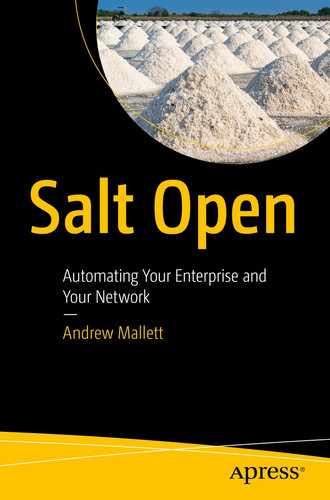You'll see how Salt Open is duplicated with ArubaOS and IOS networking devices, which can be configured without the underlying OS. As you step through the configuration options, you'll learn how to run remote execution modules from the CLI before looking at stateful configuration using SLS files. Moving on, you'll learn how to configure the systems where you also need to monitor your devices and that is when reactors and beacons come into play. Creating beacons to alert the server when thresholds are exceeded, you will be able to create reactors to mitigate the issues identified by the beacons. By the end of this book, you will be able to deploy Salt to your servers and network infrastructure. You will be able to install the Salt-Master and Salt-Minion, executing commands from both the Master and the Minion. The networking devices you need to manage will be controlled through the Salt_Proxy Minions that you have configured. Finally, you will be able to load-balance connections to the master with Salt-Syndic. What You'll Learn
Table of Contents
- Cover
- Front Matter
- 1. Understanding Salt and Configuration Automation
- 2. Installing Salt
- 3. Adding and Removing Salt Minions
- 4. Targeting Salt Minions
- 5. Working with Remote Execution Modules in Salt Open
- 6. Writing YAML Files
- 7. Writing Salt State Files
- 8. Building an Effective State Tree
- 9. Creating Reusable State Files
- 10. Implementing Reactors and Beacons
- 11. Using Salt SSH
- 12. Deploy Virtual Machines Using Salt Cloud
- 13. Scaling Configuration Management Using Salt Syndic
- 14. Automating Network Infrastructure with Salt Proxy
- Back Matter
